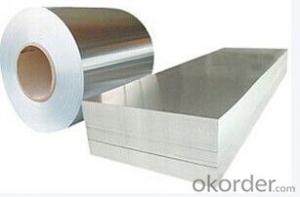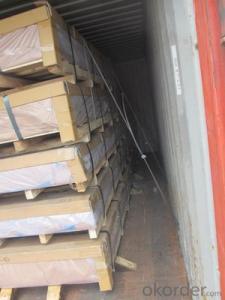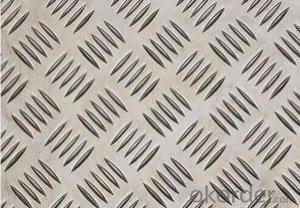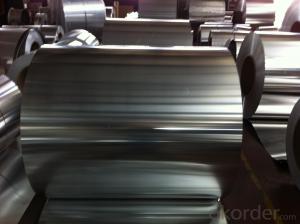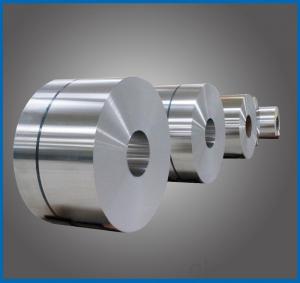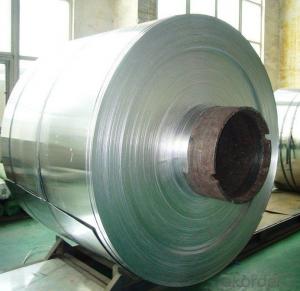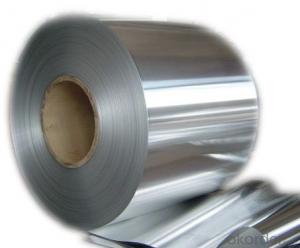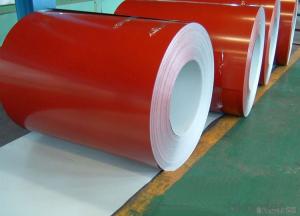AA 6061 aluminium sheet suppliers on OKorder
- Loading Port:
- China main port
- Payment Terms:
- TT or LC
- Min Order Qty:
- 1 m.t.
- Supply Capability:
- 3 m.t./month
OKorder Service Pledge
OKorder Financial Service
You Might Also Like
supply Mill-finished / coated aluminum plate/sheet/ coil:
Alloy: AA1050,1060,1100,1200,2024,3003,3304,3005,3015,5052,5086,5754,5083,6061,7050,7475,8011, etc
Temper: O, H14/16/18/22/24/32/ H112/H321/T6,T851,T7451,T7351, etc
Thickness: 0.02mm—20mm
Width: 100mm—2000mm (Can be slitted)
Notice: PE coating / PVDF coating / Embossment can be done if required.
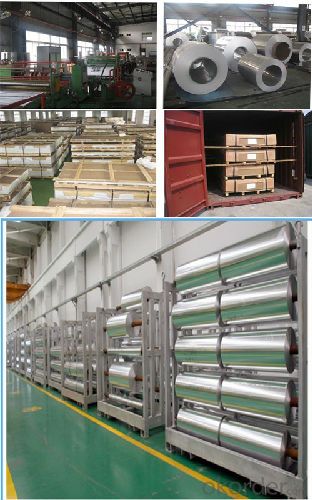
The occurrence of anode effects is because as the electrolysis process, oxygen-ion electrolyte gradually reduced, when a certain degree, there is precipitation of fluorine and carbon generate carbon anode effects fluoride, carbon fluoride in the decomposition time and fine carbon particles deposited on the carbon particles attached to the surface of the anode, electrolyte and anode to prevent contact of the electrolyte cannot properly wet the anode, like water cannot wet oiled surface as the electrolyte - anode formed between a bad air film conductive layer, the anode overvoltage increases, causing anode effect. When adding a new alumina deposited on the anode and oxygen, the reaction of oxygen and carbon black, the anode surface gradually quiet, resistance is reduced, the electrolysis process and become normal.
After 40 years of research and development, electrolytic coloring to keep the depth and breadth of development, anodized aluminum is developed from the general protective - decorative purposes to the functional film special physical and chemical properties, from single colored salt to mixed salt coloring, from single uniform color to multi-colored, multi-color sense, and so on. Current porous alumina membranes toward functional direction research mainly from two aspects, one is the use of its porous structure, the development of new ultra-precision membrane; the other is through their nanoscale pores of various deposition the nature of different substances, such as metal-semiconductor, polymer materials, to prepare a new type of functional materials.
- Q:Are aluminum coils suitable for architectural roofing systems?
- Architectural roofing systems can indeed make use of aluminum coils. The popularity of aluminum as a roofing material stems from its many advantages. To begin with, aluminum is lightweight, making it easy to handle during installation and decreasing the burden on the building's structure. Furthermore, aluminum is highly durable and resistant to corrosion, ensuring that it will last for a long time as a roofing option. Its exceptional thermal properties are worth noting as well, as it can reflect heat and lead to reduced energy consumption. Another advantage is the ease with which aluminum coils can be molded and shaped into various profiles and designs, allowing for flexibility in architectural styles. Lastly, aluminum is an environmentally friendly choice for roofing systems, as it is both recyclable and sustainable. In conclusion, aluminum coils are a practical and suitable choice for architectural roofing systems, offering durability, versatility, and energy efficiency.
- Q:Can aluminum coils be used for roofing?
- Certainly, roofing can be done using aluminum coils. Aluminum is widely regarded as a top preference for roofing materials because of its sturdy composition, lightweight properties, and exceptional resistance to corrosion. In a wide range of roofing applications, including residential, commercial, and industrial structures, aluminum roofing coils are frequently employed. They offer exceptional safeguarding against severe weather conditions like intense rainfall, snowfall, and powerful winds. Furthermore, aluminum coils possess energy-efficient attributes as they possess the ability to reflect solar heat, thereby aiding in preserving a cool indoor environment and reducing energy expenditures. All in all, aluminum coils present a dependable and enduring roofing solution.
- Q:What are the typical production volumes for aluminum coil manufacturers?
- Aluminum coil manufacturers' production volumes can vary depending on factors like the size of the manufacturer, market demand, and production capacity. Generally, these manufacturers produce large quantities of coils to meet the needs of different industries. Some manufacturers produce a few hundred tons of aluminum coils per month, while others with larger production capacities can produce thousands of tons. The specific requirements of customers also influence production volumes, as manufacturers customize their production to meet customers' demands. Industries like construction, automotive, packaging, and aerospace have high demand for aluminum coils, leading to increased production volumes. Manufacturers can also produce various sizes and thicknesses of aluminum coils, further expanding their production volumes to cater to diverse market needs. It is important to consider that production volumes for aluminum coil manufacturers can fluctuate based on market conditions, economic factors, and industry trends. Manufacturers continually work towards optimizing their production processes and capacities to efficiently meet demand while maintaining high-quality standards.
- Q:What is the typical lifespan of an aluminum coil?
- Factors such as usage, maintenance, and environmental conditions can cause the typical lifespan of an aluminum coil to vary. However, if an aluminum coil is properly cared for and regularly maintained, it can last for 20 to 30 years or even longer. It is possible to extend this lifespan by keeping the coil clean, ensuring proper ventilation to prevent moisture buildup, and promptly addressing any damages or issues. Moreover, the lifespan of an aluminum coil can also be affected by exposure to harsh weather conditions, chemicals, or corrosive environments. Therefore, it is important to seek guidance from manufacturers or industry professionals to obtain specific information about the expected lifespan of a particular aluminum coil in various applications.
- Q:I wrap everything with aluminum foil and bake it in the oven -- fish, meat, vegetables. Is this really safe? Or safe when done occasionally? Or should I find a new way?
- I use aluminium foil often for baking however I use baking paper between the food and the foil. I am sure it is safe to use foil, however I find that on occasions the foil sticks to the food, so I use the non stick paper between. I hope this helps.
- Q:How are aluminum coils cut to length?
- The process of cutting aluminum coils to length is typically done using two methods: shearing and slitting. Shearing involves the use of sharp blades to cut the coil into shorter lengths, which is commonly used for thicker coils. On the other hand, slitting is a process where the coil is passed through rotating circular knives to cut it into narrower strips of the desired width, often used for thinner coils. Both shearing and slitting can be done manually or automatically, depending on the scale of production and project requirements. Large-scale production usually utilizes automated cutting machines for their higher precision and faster cutting speeds. It is important to note that during the cutting process, the coil is usually uncoiled and guided through the cutting machine. Once the desired length or width is achieved, the cut aluminum pieces are collected, bundled, and prepared for further processing or distribution.
- Q:Are aluminum coils suitable for air conditioning systems?
- Yes, aluminum coils are suitable for air conditioning systems. Aluminum coils offer excellent heat transfer properties, durability, and resistance to corrosion, making them a popular choice in air conditioning systems. They are lightweight, efficient, and can withstand high-pressure applications, making them a reliable option for cooling and refrigeration purposes.
- Q:Can aluminum coils be used in high-humidity environments?
- Yes, aluminum coils can be used in high-humidity environments. Aluminum is a corrosion-resistant metal, making it suitable for applications in areas with high humidity levels. The natural oxide layer that forms on the surface of aluminum acts as a protective barrier against moisture and prevents the metal from rusting or corroding. This makes aluminum coils a popular choice for HVAC systems, where they are exposed to moisture and humidity on a regular basis. Additionally, aluminum coils are lightweight, durable, and have excellent heat transfer properties, making them an ideal choice for various industrial and commercial applications in high-humidity environments.
- Q:Are aluminum coils suitable for high-reflective applications?
- Indeed, high-reflective applications are well-suited for aluminum coils. Renowned for its exceptional reflectivity, aluminum boasts a reflectance ratio ranging from 80 to 90%. Consequently, it serves as an impeccable material for endeavors necessitating considerable reflectivity, including lighting fixtures, solar panels, and mirrors. Furthermore, aluminum coils may undergo coating or polishing processes to heighten their reflective attributes. Moreover, aluminum possesses the advantages of being lightweight, corrosion-resistant, and having commendable heat conductivity, rendering it a versatile option for diverse high-reflective applications.
- Q:How do aluminum coils contribute to indoor air quality?
- Aluminum coils used in heating, ventilation, and air conditioning (HVAC) systems do not directly contribute to indoor air quality. However, they play a crucial role in maintaining indoor air quality by helping to cool and dehumidify the air. By efficiently transferring heat and moisture, aluminum coils aid in controlling temperature and humidity levels, preventing the growth of mold, mildew, and other harmful microorganisms that can negatively impact indoor air quality.
1. Manufacturer Overview |
|
|---|---|
| Location | |
| Year Established | |
| Annual Output Value | |
| Main Markets | |
| Company Certifications | |
2. Manufacturer Certificates |
|
|---|---|
| a) Certification Name | |
| Range | |
| Reference | |
| Validity Period | |
3. Manufacturer Capability |
|
|---|---|
| a)Trade Capacity | |
| Nearest Port | |
| Export Percentage | |
| No.of Employees in Trade Department | |
| Language Spoken: | |
| b)Factory Information | |
| Factory Size: | |
| No. of Production Lines | |
| Contract Manufacturing | |
| Product Price Range | |
Send your message to us
AA 6061 aluminium sheet suppliers on OKorder
- Loading Port:
- China main port
- Payment Terms:
- TT or LC
- Min Order Qty:
- 1 m.t.
- Supply Capability:
- 3 m.t./month
OKorder Service Pledge
OKorder Financial Service
Similar products
New products
Hot products
Hot Searches
Related keywords
